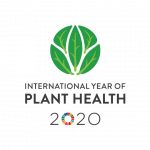Introduction
PHAB 2021 - For a sustainable future
Healthy plants are the foundation for all life on earth and plant health is key to the sustainable intensification of agriculture needed to feed the growing global population. Rising to the global challenge to work on plant health and sustainable agriculture, coinciding with the UN’s International Year of Plant Health, CABI will bring together researchers in agriculture and the plant sciences, crop protection industry and agribusiness, as well as policy makers and public sector professionals in one unique conference.
Through knowledge sharing, science and collaboration, we aim to contribute to plant protection world-wide. Mark your calendar now for the 1st international meeting of experts and contribute to the shaping of our future. Join PHAB 2021 on 22-24 September 2021 in The Hague, the Netherlands.
About IYPH
UN General Assembly proclaimed 2020 as the International Year of Plant Health (IYPH). The year is expected to increase awareness among the public and policy makers of the importance of healthy plants and the necessity to protect them in order to achieve the Sustainable Development Goals.
Finland first proposed the year to the governing body of the International Plant Protection Convention in 2015. In July 2017, the FAO Conference adopted a resolution in support of the proposal. “Pests and diseases don’t carry passports or observe immigration requirements and, therefore, the prevention of the spread of such organisms is very much an international undertaking that requires the collaboration of all countries. This is why Finland proposed to proclaim 2020 the International Year of Plant Health,” Jari Leppä, Minister of Agriculture and Forestry of Finland said.
The UN General Assembly invited FAO, with the IPPC Secretariat, to serve as the lead agency to spearhead activities, and called on governments, civil society, and the private sector to engage at global, regional and national levels. An International Plant Health Conference will be among thousands of plant health events to be held globally throughout 2020.
Healthy plants are the foundation for all life, ecosystem functions and food security. Plant pests and diseases damage crops, reducing the availability of food and increasing its cost. Sustaining plant health protects the environment, forests and biodiversity from plant pests, addresses the effects of climate change, and supports efforts to end hunger, malnutrition and poverty.

The Netherlands
Although the Netherlands (aka “Holland”) is a small country, it is a major innovative player when it comes to agriculture. Due to the country’s size, farmers have always needed to be creative when it comes to using their resources to the fullest. Nowadays, sustainable agriculture is becoming the norm and thus making the Netherlands as a world leader in the future of farming.
A sustainable agri-food giant
The Netherlands is the second biggest exporter of food worldwide, topped only by the US (which has 270 times its landmass). More than half the country’s land is used for agriculture and horticulture. There are more than 5,300 agriculture/food companies based in the country, as well as some of the world’s largest major production or R&D sites in the field.
The sector is fuelled by world-class research institutes for food innovation, medical universities and numerous public-private partnerships between science, industry and government.
Wageningen University & Research (WUR), is widely regarded as the world’s top agricultural research institution, and the hub of Food Valley (the Dutch agro-tech version of Silicon Valley), an extensive cluster of agricultural technology start-ups and experimental farms.
Nearly two decades ago, the Dutch made a commitment to sustainable agriculture by following the approach “produce twice as much food using half of the resources.” This led to the reduction of water dependence for key crops by as much as 90 percent. Dutch farmers have almost completely eliminated the use of chemical pesticides on plants in greenhouses, and since 2009 Dutch poultry and livestock producers have cut their use of antibiotics by as much as 60 percent.
Nowadays, the Dutch are working on innovative ways to increase food production, through thousand WUR projects across the globe, and throughout farms across the Netherlands.
The future of sustainable agriculture is taking shape – be a part of it! Join us in PHAB 2021.
Contact us now
for pricing, bookings and customised packages.